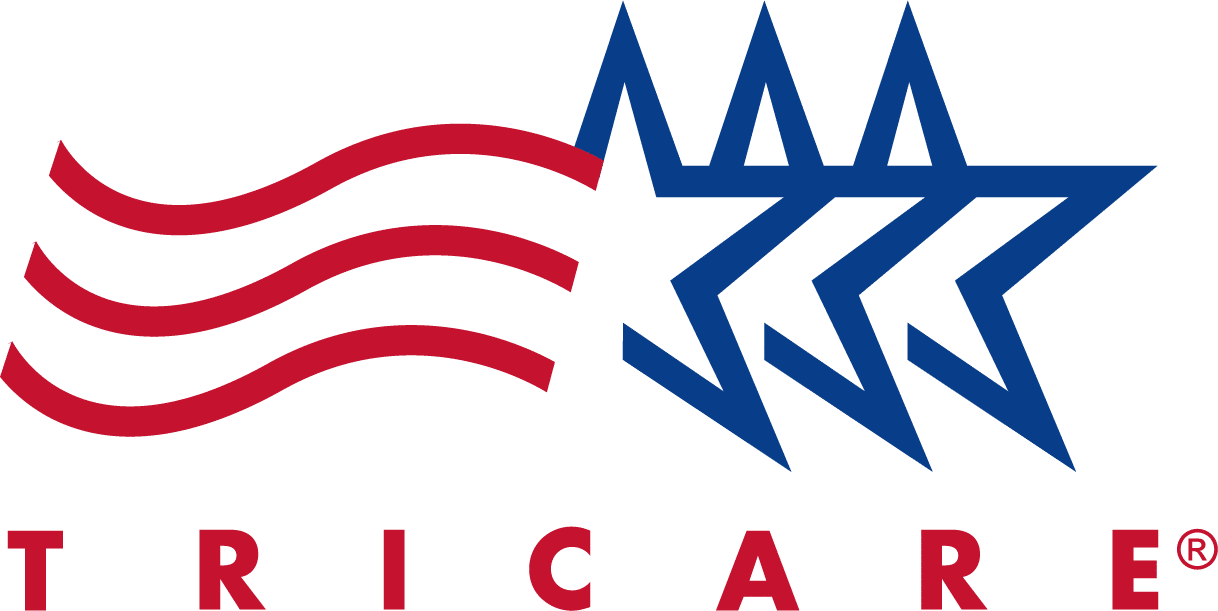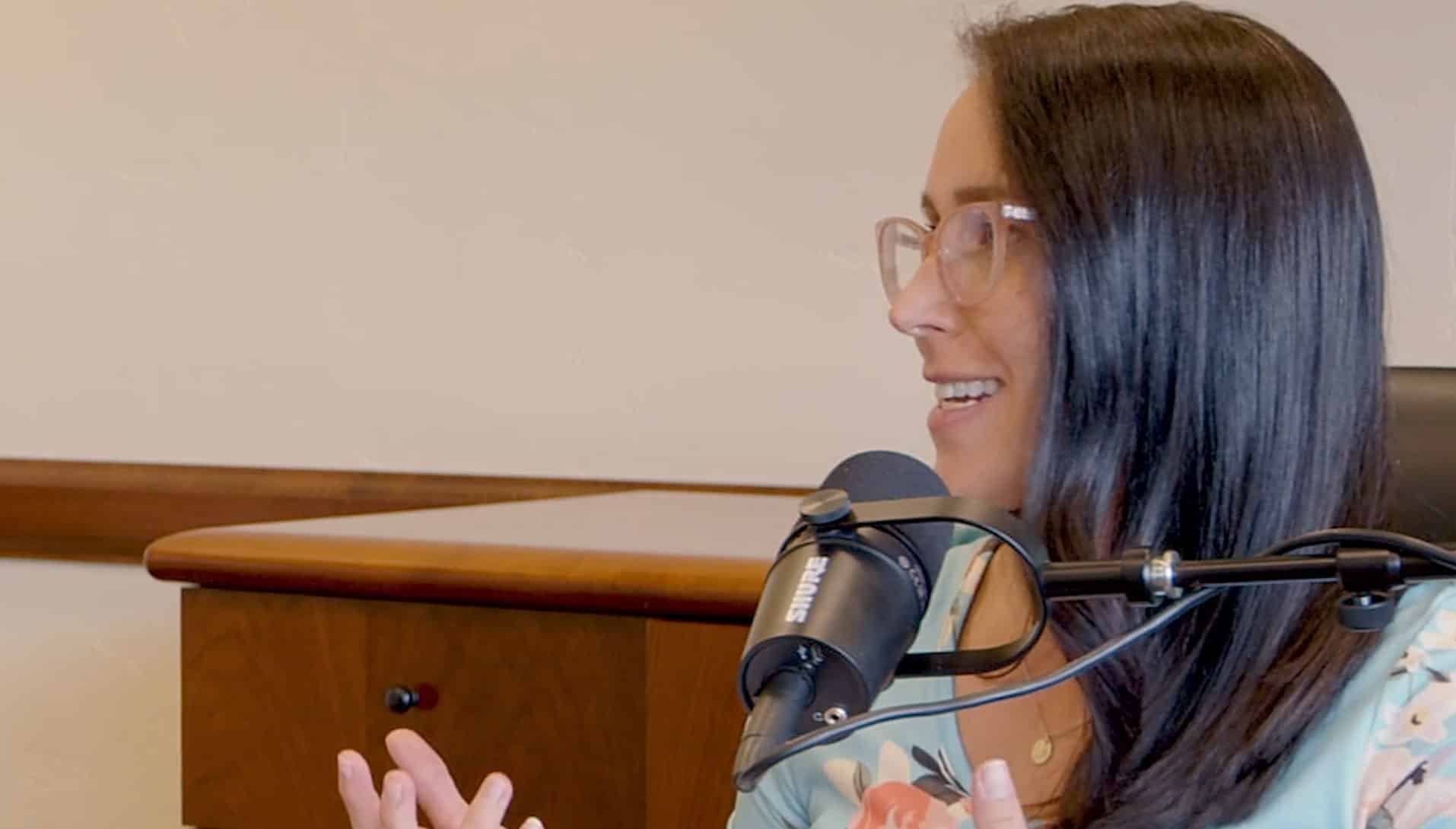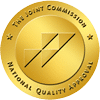Specialized Short-Term Residential Treatment for Teen Mental Health Crisis
OASIS Ascent provides comprehensive crisis stabilization, assessment, and a residential program designed to address severe mental health challenges in teenagers (ages 12-17). Find a safe, structured path to healing and renewed hope for your teen and family.
Immediate Mental Health Help for Teens and Families in Crisis
Find immediate stabilization, expert assessment, and compassionate care for your teen at OASIS Ascent. Our program is made for boys and girls ages 12–17 who are struggling with mental health, offering a safe and structured place where healing can start.
The urgency and fear you're feeling right now are understood here. Whether your teen is struggling with self-harm, suicidal thoughts, severe anxiety, depression, trauma, or other behavioral and mental health challenges, a team of experienced clinicians stands ready to help your family find a path forward.
Your teen will receive 24/7 professional supervision, comprehensive mental health evaluations, and evidence-based therapies. Beyond addressing the immediate crisis, OASIS Ascent uncovers the root causes of your teen's struggles while providing the tools and support your entire family needs for lasting change.

At OASIS Ascent, we understand that while the need for support is universal, the experiences of boys and girls can differ. Select the program below to learn more about our tailored approach.
Our Mission
The mission of OASIS Ascent is to provide teens and their families a place of refuge and healing, along with an abundance of hope for a brighter future.
Real Stories of Hope and Healing
Hear from a student who came to OASIS Ascent struggling with trauma and mental health challenges. Through intensive therapy, including EMDR, and the support of compassionate staff and peers, he found healing and a renewed sense of purpose. Today, he’s preparing for college and considering a future in psychology to help others just like him.

These transformations don’t happen by accident—they result from a carefully designed approach that prioritizes safety, insight, and family connection from day one.
How OASIS Ascent Helps Your Teen Heal
- Immediate Safety and Stabilization: When your teen is experiencing a mental health crisis, finding them a safe and secure environment to stabilize becomes the top priority. At OASIS Ascent, you will receive immediate care and support to help your teen regain control of their emotions and stop them from dangerous behaviors. From arrival, your son or daughter will be surrounded by trained professionals in a secure, home-like environment that prioritizes emotional and physical safety. With 24/7 supervision and compassionate clinical care, you will gain peace of mind knowing your child is no longer in danger and can begin the path toward healing.
- Personalized Care Through Assessment: Understanding what is going on with your teen is key to lasting change. At OASIS Ascent, your family will gain clarity through comprehensive, holistic assessments that uncover the root causes of your teen’s mental health challenges. These in-depth evaluations—ranging from psychological and psychiatric assessments to medical exams, genomic analysis, nutritional reviews, and academic testing—provide a full picture of a teen’s strengths, struggles, and needs. With insights from a multidisciplinary team, your teen will receive a personalized treatment plan that supports their growth across every area of wellness: emotional, mental, physical, social, academic, environmental, and more. This level of insight empowers better decisions and more effective overall care.
- Strong Family Involvement: Supporting a teen’s recovery means supporting the whole family. At OASIS Ascent, you will be an essential part of your teen’s healing process from the very beginning. Through weekly family therapy sessions with experienced clinicians, you’ll gain insight into your teen’s challenges, strengthen communication, and begin rebuilding trust. You’ll have access to weekly parent support groups—a space to connect with other families who understand what you’re going through. You will also have access to the “Parent Portal”, where you will be able to log in online and read updates throughout the week about your child’s well-being and their therapeutic progress. Rather than treating your teen in isolation, OASIS helps your whole family grow stronger together, setting the foundation for long-term healing at home.
Why Families Choose OASIS Ascent
When your teen is in crisis, OASIS Ascent provides immediate help, expert assessment, and compassionate care in a short-term residential setting that restores hope and direction for your family.
OASIS Ascent offers teens ages 12-17 facing mental health crises:
- A safe environment with 24/7 professional supervision
- Comprehensive evaluations leading to personalized treatment plans
- Evidence-based therapy (like DBT and CBT) to build coping skills
- Family support through therapy, groups, and hands-on guidance
- Insurance navigation assistance and aftercare planning
With Joint Commission accreditation and proven outcomes, OASIS Ascent delivers the urgent intervention and lasting results your family needs.
Of course, finding the right care is only one part of the journey—understanding how to access it through insurance is another. That’s why we make this process easier for you.
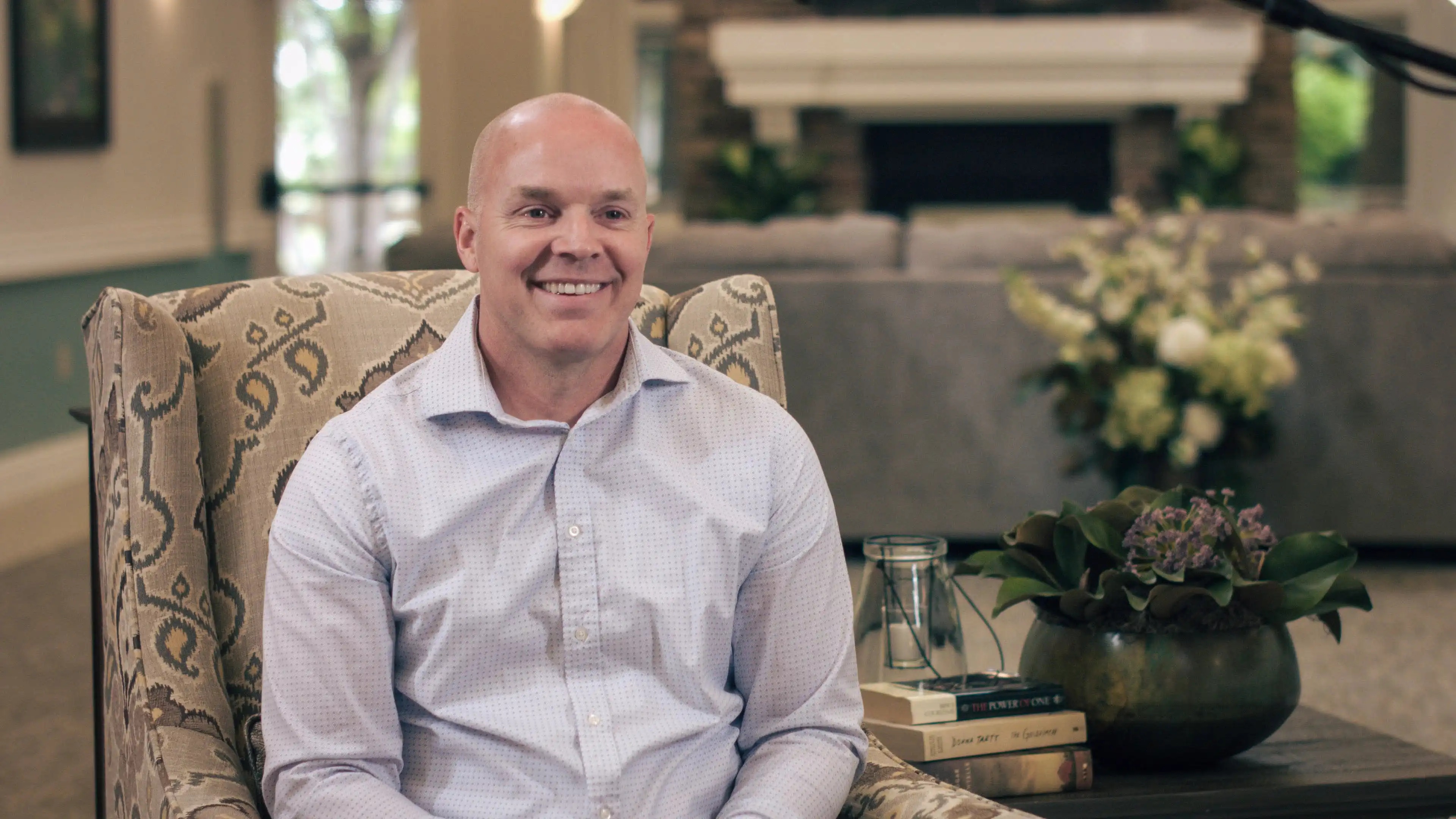
Get Help Navigating Your Insurance Coverage
Concerned about the cost of specialized residential treatment? At OASIS Ascent, we specialize in maximizing your health insurance coverage to make treatment accessible. Unlike other facilities, we are committed to expanding our network to serve more families. Our expert Utilization and Billing teams work for you, translating complex policies into clear financial solutions. We are In-Network with a diverse and expanding range of insurers, covering major plans like TRICARE, United Healthcare, Optum, First Health, Select Health, and a list of others. We handle the complexities of eligibility, pre-authorization, and benefit utilization to ensure you secure the best possible coverage.
Mental Health Podcast Introducing Navigating Your Teen’s Mental Health Crisis Podcast
Hear from mental health experts as they give practical tools, compassionate guidance, and expert advice to parents. This series is designed specifically for parents like you who are trying to make the best decisions during one of the most difficult times of your family’s life.
Holistic Treatment Approach
At OASIS Ascent, your teen’s treatment goes beyond surface-level symptoms. We take a holistic approach to mental health treatment because true healing happens when we treat the whole person, not just the crisis.
From day one, your teen will receive a comprehensive evaluation of every wellness dimension. Based on that assessment, we build a personalized treatment plan that supports your teen emotionally, physically, socially, academically, and spiritually.

Here’s what that includes:
- Emotional & Social Wellness
Individual and family therapy, group sessions, experiential therapy, and a full mental health assessment to guide treatment. - Physical Wellness
Onsite nursing and psychiatry, medication management, nutrition screenings, sleep monitoring, and genome testing help us understand your teen’s full health picture. - Mental/Academic Wellness
Daily schooling, academic advising, credit recovery, test prep, and personalized support so your teen stays on track. - Occupational Wellness
Life skills training, career exploration, and goal setting to help your teen prepare for the future with confidence. - Spiritual & Environmental Wellness
Daily movement, mindfulness practices, and nature-based therapy promote inner balance and a sense of belonging.
By addressing all areas of your teen’s life, we set the stage for long-term success, not just temporary relief. At OASIS Ascent, your teen will have the tools, support, and confidence to heal and move forward.
Before a treatment plan can be built, we need to understand your teen completely. That’s where our in-depth stabilization assessments come in.
In-Depth Assessments to Guide Treatment from Day One
When your teen faces a mental health crisis, understanding the full picture becomes essential for effective intervention. OASIS Ascent's stabilization assessment process provides the foundation you need for successful crisis management and recovery.
Your family will receive thorough evaluations that go beyond standard mental health screenings. Every aspect of your teen's wellbeing will be examined through:
- Psychological Evaluations - Identifying underlying emotional challenges and behavioral patterns
- Psychiatric Consultations - Determining if medication might benefit your teen's treatment plan
- Medical Assessments - Ensuring physical health factors aren't contributing to mental health symptoms
- Genomic Analysis - Understanding biological factors that may influence treatment responsiveness
- Nutritional Assessments - Recognizing how diet may impact mental health stability
- Academic Testing - Identifying educational factors that might be adding to your teen's stress
These comprehensive assessments create personalized stabilization plans that address your immediate safety concerns while building a foundation for your family's lasting recovery. Rather than generic solutions, your teen receives care tailored specifically to their unique situation and needs.
The goal of these stabilization assessments is to provide you with clarity during your confusion, direction during your uncertainty, and expert guidance precisely when your family needs it most.
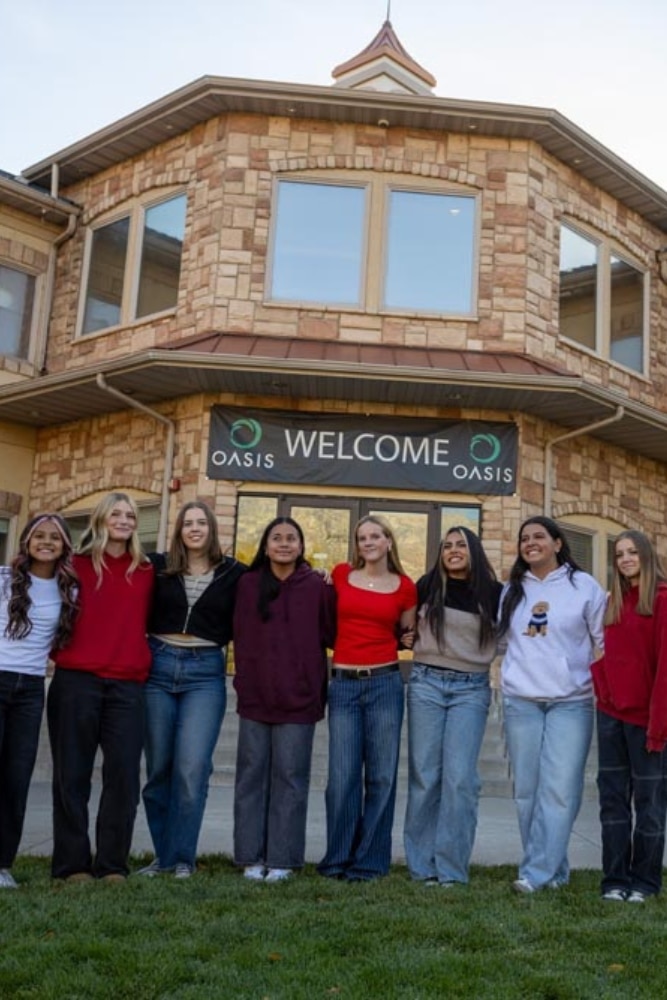
Who We Help at OASIS Ascent
OASIS Ascent is designed for teenagers facing a mental health crisis who need immediate, intensive support. Our short-term residential treatment program provides separate tracks for boys and girls in a safe, structured, and nurturing environment.
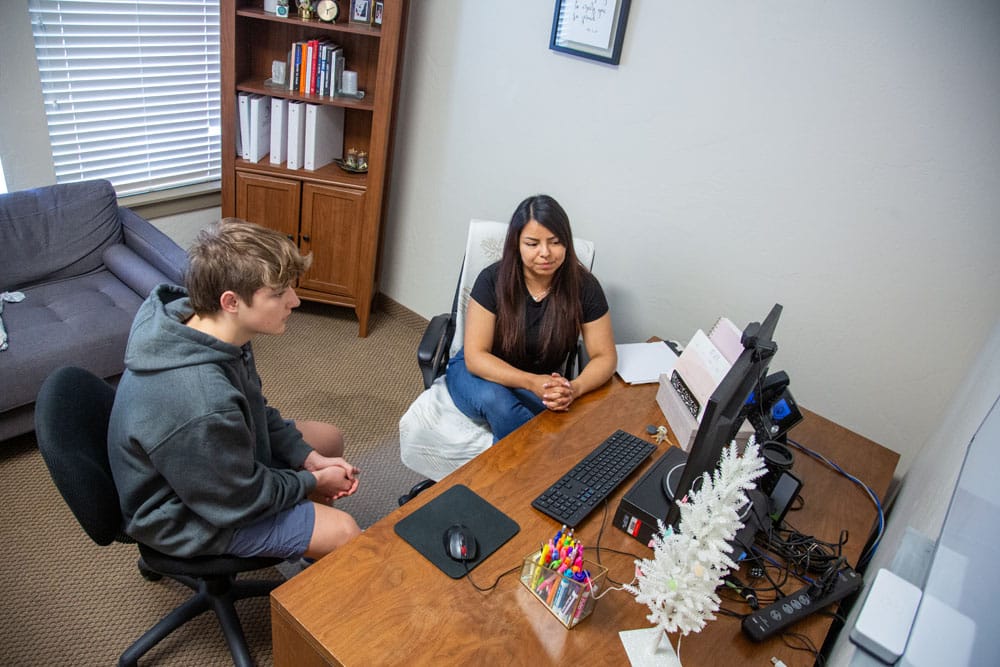
Teens Who May Benefit from OASIS Ascent
In Crisis and Needing Stabilization
These behaviors often signal a crisis and may escalate without immediate support and intervention:
- Self-harm: Cutting, burning, or other forms of intentional self-injury.
- Suicidal thoughts: Thoughts of harming or killing oneself; a medical emergency requiring urgent care.
- Running away: Leaving home without notice, potentially placing the teen in dangerous situations.
- Anger issues: Frequent or intense emotional outbursts that interfere with relationships and functioning.
- Family conflict: Ongoing tension or inability to follow family rules, often leading to relational breakdown.
- Lying and manipulation: Habitual dishonesty or controlling behaviors that damage trust and stability.
- Risky behaviors: Actions like reckless driving, unsafe sex, or illegal activity that pose danger.
- Impulsivity: Acting without thinking, leading to poor decision-making and consequences.
- Behavioral addictions: Compulsive behaviors (e.g., gambling, shopping) that interfere with daily life.
- Technology addiction: Overuse of phones, social media, or gaming that disrupts healthy functioning.
- Sexual promiscuity: Risky or unsafe sexual activity, both online and in person.
- Other behavioral struggles: Any crisis-related behaviors not listed but causing serious concern.
Seeking a Safe and Supportive Setting
Teens who need 24/7 supervision, therapeutic support, and a break from daily stressors to focus on healing.
Requiring a Comprehensive Mental Health Assessment
Ideal for families needing a clear understanding of their teen’s emotional, behavioral, or psychiatric struggles.
Living with Diagnosed or Undiagnosed Conditions
These are clinical or diagnosable conditions that often underlie a teen’s emotional or behavioral crisis:
- Depression: Persistent sadness, withdrawal, or hopelessness affecting mood and motivation.
- Anxiety: Excessive worry, fear, or panic that interferes with everyday activities.
- Trauma: Responses to distressing events (e.g., abuse, loss, accidents) that disrupt functioning.
- ADHD (if relevant to context): May contribute to impulsivity or difficulty with emotional regulation.
- Co-occurring disorders: When two or more mental health issues are present, it increases the complexity of the teen’s needs.
In Transition from Another Program
Teens stepping down from wilderness therapy, a therapeutic boarding school, or another residential treatment program.
Not Sure Where to Start? Begin Here
OASIS Ascent offers more than just short-term care—it provides clarity, stabilization, and a path toward long-term healing. If you're unsure what your teen needs, we encourage you to begin with our free, no-obligation assessment. It’s the first step toward understanding your child’s needs and determining the best treatment path forward.
The Impact OASIS Ascent Has on Teens and Their Families
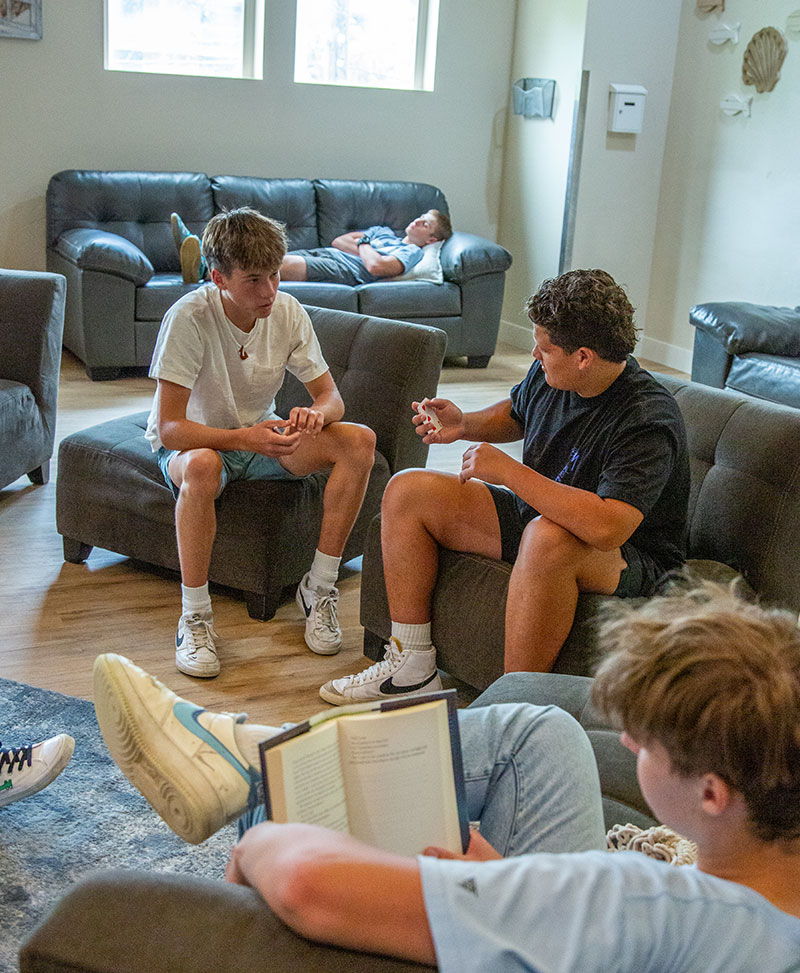
At OASIS Ascent, we believe in the power of outcomes, not just to measure success, but to guide improvement. That’s why we actively seek feedback from the teens and families we serve. Their voices help us understand what we’re doing well and where we can grow, so we can continue to offer the highest level of care and support.
The results below reflect just how impactful our short-term residential treatment program can be for teens in crisis—and for the parents who love them.
Our Accreditations and Clinical Credentials
At OASIS Ascent, we’re committed to the highest standards in mental health care, safety, and education. Our accreditations and affiliations reflect our dedication to providing evidence-based treatment in a safe, nurturing environment. These recognitions ensure families can trust that the care their teen receives is not only compassionate but also held to nationally recognized standards of excellence.

OASIS Ascent is also fully licensed in the state of Utah.

Designated as a NATSAP Research Program, showing our commitment to well-researched practices in our program.
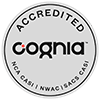
This program is proud to be Cognia Accredited. Cognia provides accreditation to schools that have earned recognition for their reputation and high educational standards.
